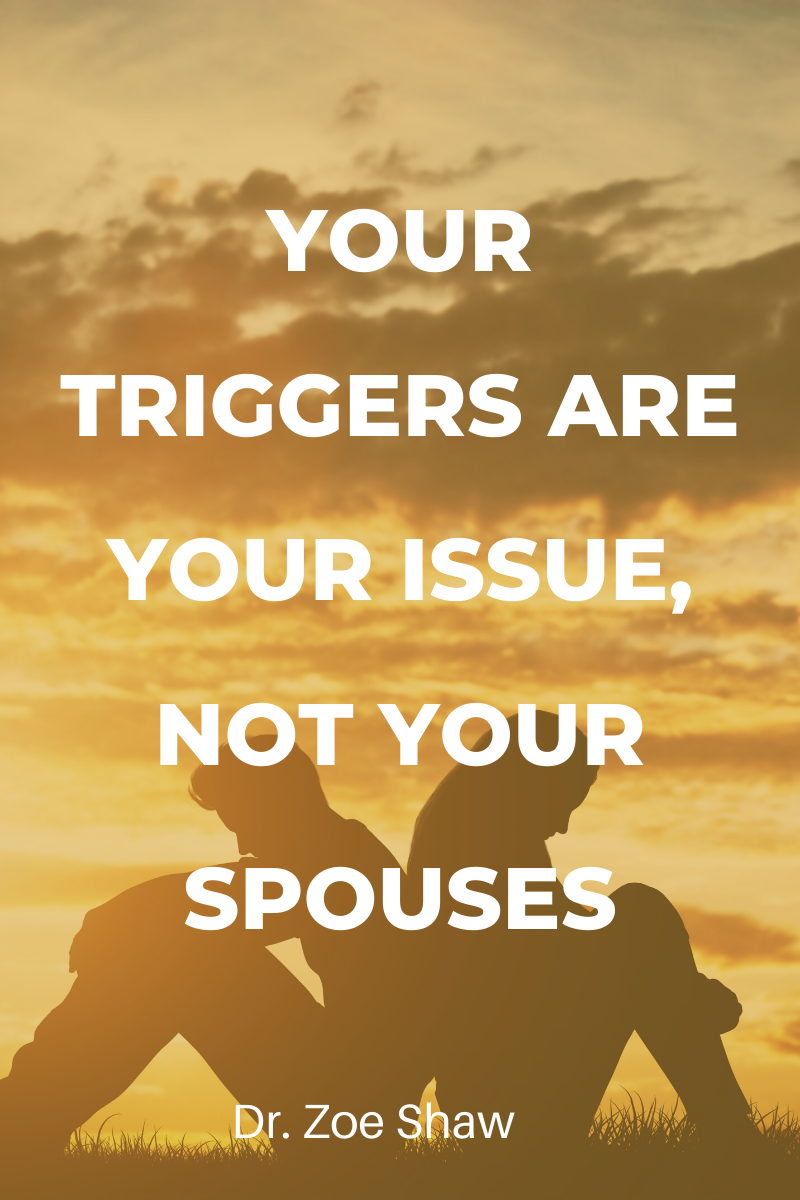What is a trigger anyway?
What To Do When Your Partner Triggers You
Basically, you can’t live in this world without collecting some wounds. Experiences of being unheard, devalued, deceived, criticized, or betrayed are examples of these wounds. Once you’ve been wounded, you are often on the lookout (something we call hyper-vigilant) to make sure that you don’t get hurt again. It’s a basic self-preservative defense mechanism.
If you were hit often, you’re probably going to flinch if someone moves quickly towards you. Someone else, who hasn’t been abused in that way doesn’t have that on their radar and may not even respond.
This system works the same from an emotional level. It only takes a hint of the original pain to cause a reaction. And our response is really an overreaction because we are responding based on something that doesn’t exist in our reality.
When we overreact with our partners, they don’t understand why we are freaking out over such a tiny thing, which in turn ignites their frustration and anger. They defend, which may feel re-wounding to you. In that interaction, you have just created the very thing you feared. And if your overreaction is actually a trigger of their own- well, you’ve just started World War three over nothing real in the present.
But the hurt is very real. A wound has just been opened and it’s painful.
I had to explain to my husband what a trigger was because the first time I told him that something he did triggered me, he was like: “What are you talking about”?
It was actually a good thing because I could explain to him in such a way that I wasn’t blaming him for what he did. By the way, your triggers are YOUR issue, not your spouses. Understanding and explaining your triggers to your spouse doesn’t make it his problem now to fix and avoid.

You don’t want to be a minefield that someone needs to tiptoe around. Take responsibility for your own issues, but be considerate enough to let your spouse know what he’s dealing with at the same time.
Sometimes the trigger really IS about your spouse. Maybe he cheated on you in the past. Maybe he has wounded you in some other way and you’ve worked through it, but you are super sensitive to that happening again.
If he is the one that wounded you, it’s still a trigger, but it’s more of a relationship issue than yours alone. This is where you have to be super intentional about knowing yourself. You need to go deep and answer questions honestly for yourself about what your wounds are and from where they came.
So how do you know if it’s a trigger and you are projecting or you are justifiably mad at your partner?
You’ve got to identify your wounds.
 Tell me about your wounded child? I know you can’t really tell me because I’m here and you’re there, but if I was working with you, I would want to know about her. Who wounded her and how? What is she worried is going to happen again? Those, my dear friend are your triggers. If you don’t learn to work with her- if you don’t work on healing her, you will see those threats everywhere and will manifest them in your relationships. These feelings can be scary and painful. It’s much easier to blame them on someone else and not own them and work through them.
Tell me about your wounded child? I know you can’t really tell me because I’m here and you’re there, but if I was working with you, I would want to know about her. Who wounded her and how? What is she worried is going to happen again? Those, my dear friend are your triggers. If you don’t learn to work with her- if you don’t work on healing her, you will see those threats everywhere and will manifest them in your relationships. These feelings can be scary and painful. It’s much easier to blame them on someone else and not own them and work through them.
When you find yourself saying he always and he never, those are really global statements and you need to ask yourself if that is really true.
When you find yourself getting so very upset, Ask yourself what was the offending behavior and if it is one of your triggers? Go to your partner and say. “I’m sorry. I got triggered because of these behaviors. That’s why I overreacted.”
Now, it may be a behavior that you are not okay with and you can address that as well, by saying; “Even though I was triggered and my reaction wasn’t solely about this issue, I am still not okay with that behavior in our relationship.”
It’s important to know your partner’s triggers as well. If your relationship is in a healthy enough place, you can explore them together. If not, that’s okay too. This is a do it yourself project.
And did I mention that you should get some help? Whether it’s processing with a best friend or reading a lot of self-help about healing your wounds. You’ve got some work to do and the dividend payoffs are huge.
Reach out if you need some help. You’ve got this!
Share this Post

